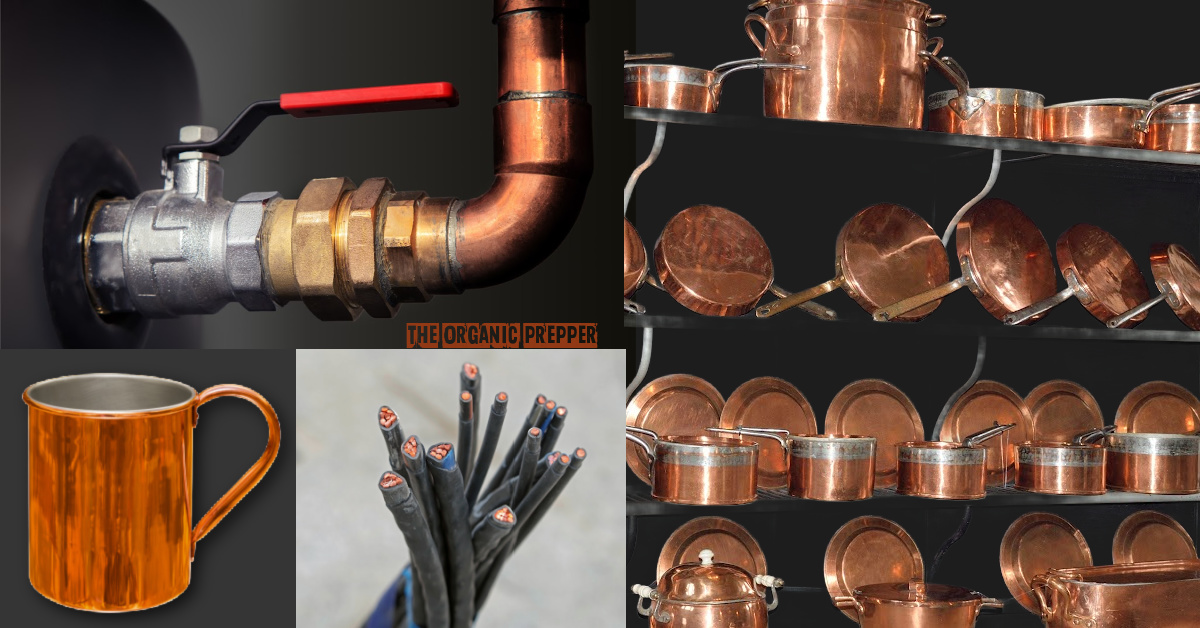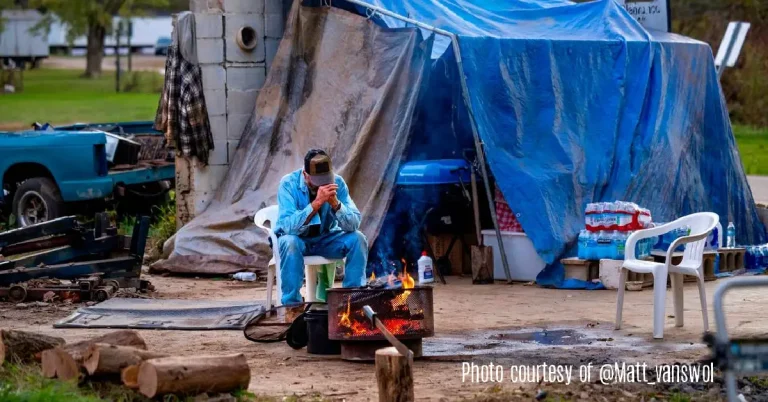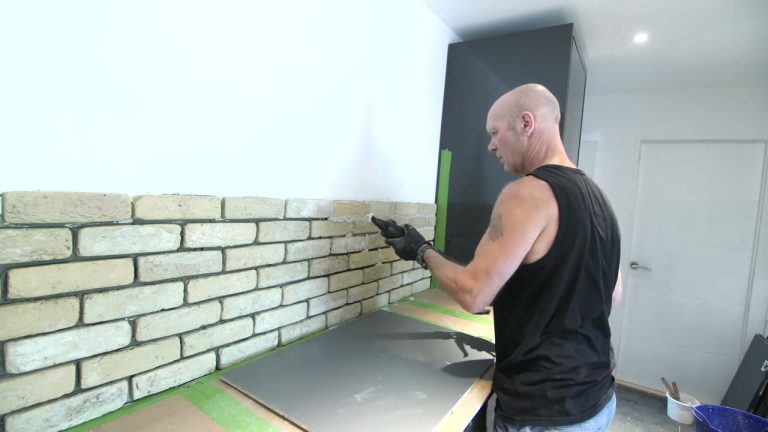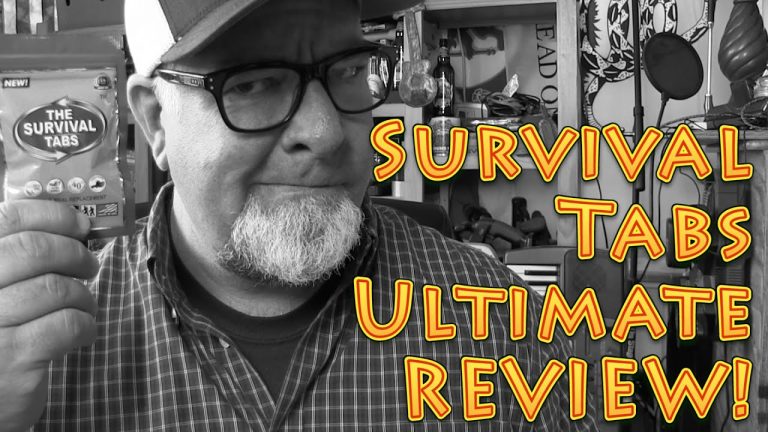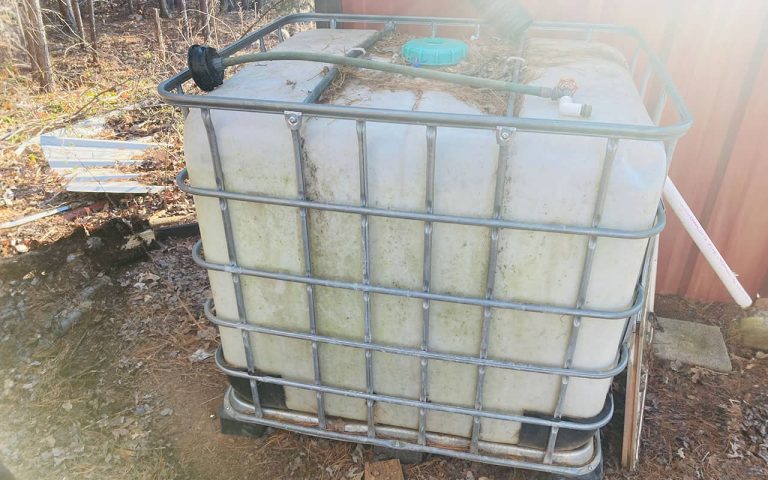(Psst: The FTC wants me to remind you that this website contains affiliate links. That means if you make a purchase from a link you click on, I might receive a small commission. This does not increase the price you’ll pay for that item nor does it decrease the awesomeness of the item. ~ Daisy)
Sometimes, our crowd focuses a little bit too much on gear and equipment. However, the properties of different materials and their usefulness are often underappreciated. Take the importance of copper in prepping, for example.
Copper is a versatile metal with many uses, including in construction, electronics, and medicine. It is also an important survival resource.
It is an essential nutrient for the human body and helps to support a healthy immune system. Additionally, copper pipes can help to reduce the risk of some nasty bugs like the one causing Legionnaires’ disease, a serious lung infection that can be caused by bacteria in water.
When my kid was growing up, I asked my mom for a silver-lined spoon that had been in our family for decades. We used it to feed him, and he grew up quite healthy, indeed. Most of his colds were because of the contact with other toddlers in the daycare, but he did not get sick often, either. This is an example of the benefits of using metals.
Why is copper so useful?
Copper has many properties that make it valuable:
- Conductivity: Copper is an excellent conductor of heat and electricity. This makes it useful for cooking, heating, and powering devices.
- Antimicrobial properties: Copper has natural antimicrobial properties that can kill bacteria and other microorganisms. This can help prevent the spread of disease in a survival situation. In my opinion, this is one of the most important properties.
Therefore, Copper is excellent to use for the following:
- Cooking: Copper pots and pans are good for cooking food over a campfire or other heat source. Copper is a good conductor of heat, which helps food to cook evenly. Safety measures wise, they will work for a long time as they don´t get too rusty with the stove flame. However, be very aware that copper will accumulate in the human body. If you’re going to use copper cookware make sure it is lined with stainless steel like this. It is best suited for low-heat applications.
- Heating: A copper pipeline can be used to make a coil to use even inside your stove or fireplace. There are plenty of great devices that are used to heat water that will naturally ascend for a pipeline to end in a tub for a bath.
Copper: A great ally (if used reasonably!)
We can’t know if our world will be one where survival depends on cunning and preparation in the future. Imagine if, for some reason, the grid water stops flowing. This metal, naturally occurring and easy to work with, becomes a powerful weapon against bacteria, viruses, and other pathogens, providing a crucial advantage in extreme situations.
- Copper has a natural biocidal action, eliminating a wide range of microorganisms. Its mechanism of action is multiple, damaging the cell membrane of pathogens, altering their metabolism, and ultimately causing their death.
- Proven effectiveness
- Scientific studies have demonstrated the effectiveness of copper against bacteria such as Escherichia coli (E. coli), Staphylococcus aureus (S. aureus), and Salmonella, responsible for gastrointestinal diseases and skin infections. This biocidal action has also been evident against viruses such as influenza A H1N1 and coronavirus SARS-CoV-2.
Mind you, the bacterial infections mentioned above are not exactly common in my country. But rest assured, they will experience an inevitable surge when sanitary conditions and access to medical attention and medicines deteriorate, no matter where you are.
Practical applications
Copper has various uses by homesteaders. Some ways to prevent disease and maintain a hygienic environment are:
- Water purification: Copper pipes or copper-infused filters can be used to remove bacteria and viruses from drinking water. I believe this is the easier way to go. The temporary (and strong emphasis on temporary) storage of drinking water in a copper vessel makes a lot of sense if one wants to lower the odds. However, there are some special considerations. As with many other metals, you need to be aware of the safe limits. Consuming water that has been stagnant in contact with a copper container for too much time can be harmful so be careful in this regard. As usual, the greater the power, the greater the responsibility. I would rather drink three cups per day of Copper water, should a cholera outbreak someday happen to erupt, than risk it all with that nasty disease.
- Wound care: Copper-impregnated bandages or topical applications of copper ointments can speed healing and prevent infection in wounds.
There are many advantages to using copper.
Effectiveness
Eliminates a wide range of pathogens coming in contact with copper surfaces, including bacteria, viruses, and fungi.
Accessibility
It is a relatively abundant metal and easy to find in nature.
Versatility
If the buses connecting the poles of your battery rack cells need replacing for some reason, or if you are looking to build one on the cheap, using a piece of copper pipe will be a permanent solution. This will be more detailed in Instructables available in the future, as this is a material universally available. A very interesting application is using pipe copper as buses between the poles of battery cells. I like this option better, as the properties like the alloy and the thin thickness used in the commercial lugs sometimes are not as good.
On the other hand, if you have done it previously with homemade buses you will never run out of these pieces as long as you have a length of pipe. Copper pipes are versatile and used for many plumbing applications, including hot and cold water lines, drainage systems, and radiant heating systems. They can also be easily bent and shaped, making them ideal for complex installations. Such flexibility allows plumbers to design and install plumbing systems that meet the specific needs of any building.
This is very convenient: maybe you want to wrap a few coils around (or even inside) the stove to always have warm water. There are plenty of possibilities. These pipes are visually attractive, too, and will add some value to kitchens or bathrooms and give them that classic, vintage look – or steampunk, whatever you prefer.
Durability
Copper pipes were standard for plumbing in residential and commercial buildings for decades. While newer materials like PVC plastics have emerged, copper still offers many advantages that make it a great choice for plumbing systems. Copper pipes are very durable and can last for several decades with proper maintenance. They are corrosion-resistant, which means they are less likely to leak or burst. The tubing conducting the cooking gas from the bottle to our stove at mom’s home has been there since I was a little boy. That means almost 50 years. They are a wise investment for homeowners who want to avoid costly repairs and replacements. I have never lived in cold climates, so please feel free to add value and correct me as much as you like (in a civilized manner, as usual, s’il vous plaît). If your main pipe is from some plastic and has burst because of freezing, I would bite the bullet and get a copper pipe. By doing it this way, with a redundant pipeline as an alternative to your PEX pipeline, you achieve a few extra goals:
- Improve the general reliability index of your water supply
- The value of your property will increase.
- You will have passed your main water supply through a biocide agent.
Reliability
Copper pipes are highly reliable and can withstand high water pressure and temperatures. This makes copper a dependable choice for plumbing systems that need to function consistently and efficiently. However, they can be susceptible to freezing and bursting if they are not insulated, which is especially important in colder climates.
Efficiency
Copper pipes are highly effective in transferring heat, which makes them ideal for hot water lines in systems where you can afford some heat transfer to the environment. They can transfer heat quickly and efficiently, reducing energy costs and providing consistently hot water throughout the home. Furthermore, copper pipes have a smooth surface on the inside, thus reducing friction and allowing for better water flow.
Sustainability
Copper is a sustainable material that can be recycled multiple times without losing quality. Copper pipes are naturally antimicrobial and won´t grow bacteria and mold inside, so they can be recycled. Currently, copper scrap has a very good market price in the industrial foundries that produce copper wires in the country.
It is important to note that prolonged contact with copper can cause skin irritation. When handling copper objects, it is recommended that you wear gloves and avoid direct contact with your eyes and mucous membranes.
Copper is a natural ally for humans, offering an effective defense against pathogens in situations where hygiene and health are critical is a fundamental feature we should consider.
Mind you, all the uses of copper for medical purposes are widely documented. This information should not be used as the ultimate guide to a better life using copper. It is a mere guide, an introduction to what this element has to offer.
As a metallurgist, I have some more-than-average information about the effect of metals on the human body. Mind you, as a general rule, most metals are toxic. Do your research so everybody can sleep well.
For these and some other reasons, I believe that a few lengths of copper pipe are safe, at least in some parts.
It is a metal in short supply in Venezuela. There is a large shady market where foundries do not ask too much where all that scrap comes from.
However, it is unsure whether that size of business will continue to function in a total meltdown, which will make it less attractive to scavengers.
Read a lot and do your research about the safety of using this metal, but copper has been a good material for the applications mentioned above, and it will likely continue to be so in the future.
Keep safe, and stay tuned!
J.
Do you use copper?
Do you incorporate copper into your home, kitchen, and workshop? Have you used it successfully in any projects? Do you find it to be a useful metal? Do you have other uses that you could add?
Let’s discuss it in the comments section.
About Jose
Jose is an upper middle class professional. He is a former worker of the oil state company with a Bachelor’s degree from one of the best national Universities. He has an old but in good shape SUV, a good 150 square meters house in a nice neighborhood, in a small but (formerly) prosperous city with two middle size malls. Jose is a prepper and shares his eyewitness accounts and survival stories from the collapse of his beloved Venezuela. Jose and his younger kid are currently back in Venezuela, after the intention of setting up a new life in another country didn’t go well. The SARSCOV2 re-shaped the labor market and South American economy so he decided to give it a try to homestead in the mountains, and make a living as best as possible. But this time in his own land, and surrounded by family, friends and acquaintances, with all the gear and equipment collected, as the initial plan was.
Follow Jose on YouTube and gain access to his exclusive content on Patreon. Donations: paypal.me/JoseM151







